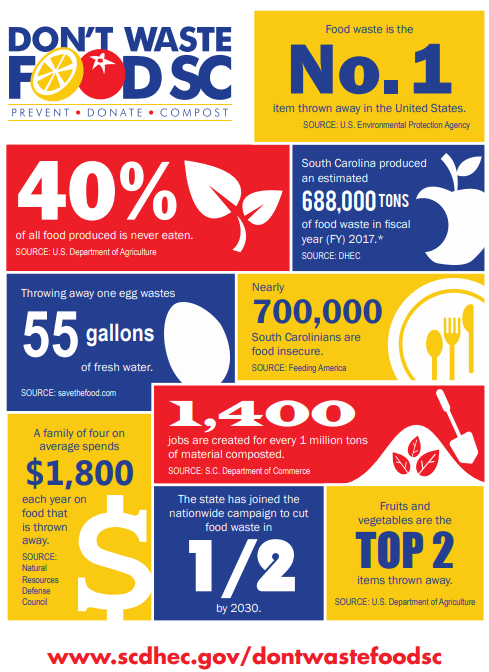To ensure you’re receiving the most up-to-date and accurate information, please choose the correct agency from the homepage. The DHEC website is no longer being updated and will be permanently unavailable Dec. 31, 2024.
This Earth Day, Let’s Tackle Food Waste Together

By: Bureau of Environmental Health Services
When people think about Earth Day, some of the things that come to mind are recycling, planting trees, and reducing pollution. Consider food safety and the reduction of food waste in this conversation. With 40% of all food in the United States being wasted every year, it is easy to see that this is a serious problem that needs to be addressed. These food habits lead to massive amounts of money wasted and environmental degradation – even though in South Carolina alone, 1 in 7 people, including 1 in 5 children, struggle with hunger according to Feeding America. Fortunately, this is a challenge that can be addressed both individually and systemically.
You Can End Food Waste! It Starts at Home
A couple of strategies for individual food waste management:
1). Purchase only what you know you’re going to eat. When our refrigerators become overpacked, air is unable to properly circulate, and proper temperatures of less than 40 degrees Fahrenheit cannot be maintained. This results in food going bad and needing to be thrown out and energy being wasted through a constantly running refrigerator. In case you need a good visual of the journey of bringing food to our tables, watch “The Extraordinary Life and Times of a Strawberry” put on by the Save the Food campaign and Ad Council.
2). Regularly monitoring refrigerator temperature is an effective way to ensure your food isn’t going bad.
3). Learn about date labels. Date labels, such as “best by” and “use by,” most often refer to quality. Even though a date label has been exceeded, a food product is not necessarily unsafe.
To find tips and tricks for storing and preparing your food visit: https://savethefood.com/storage and https://www.foodsafety.gov/keep/index.html.
4). Practice portion control and keep your leftovers. By doing this, you can end up reducing your “waist” with both your body and food. Whether you are eating out at a restaurant or have over prepared a meal at home, have a storage container on hand to have a tasty snack later in the day or week.
5). Donate! Food banks and local food drives are always looking for more items. Since roughly 25% of all food and beverages purchased by families in the United States end up in the trash, there is an abundance of food being wasted that could be used to feed those in need. To learn more about where to donate food, you can visit: https://feedingthecarolinas.org/.
For additional tips on how to reduce your food waste at home, DHEC’s Guide for Reducing Food Waste at Home is an amazing resource!
Addressing the Systemic Causes of Food Waste
As a community, the most effective way to make sure food waste stops before it starts is to support local and national food waste reduction initiatives. There are no national regulations directing consistent food date labeling. With 17% of restaurant meals going uneaten and 55% of leftovers not even being taken home, oversized portions are serious contributors to food waste and any comprehensive food waste program should take this into consideration. If your household or business is interested in addressing the issue of food waste, consider becoming a Don’t Waste Food SC Food Ambassador. DHEC has created a toolkit to get you started.
Do Your Part This Earth Day
Failure to manage food waste can lead to increased pollution. Food waste ends up in landfills and food decomposition adds to the pollution generated at those sites. Municipal solid waste landfills are the third largest source of methane emissions in the United States according to the U.S. Environmental Protection Agency. You can help decrease those emissions by turning wasted food into compost or donating it to local food banks, food rescue organizations, and other non-profits. This Earth Day do your part to reduce your personal food waste and spread the word about this increasingly important issue. Not only will you help protect the Earth that all of us share, you will save some money while you do it! For more information on how you can help tackle the problem of food waste, you can visit Don’t Waste Food SC!